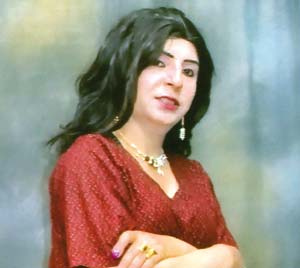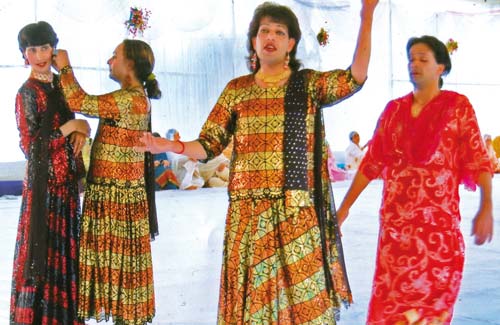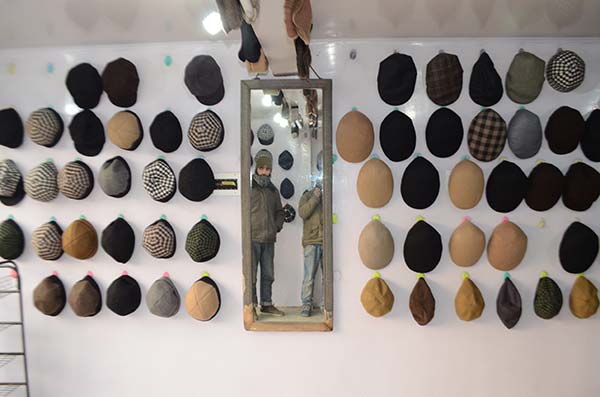Abandoned by their families and stigmatized by the community, the members of third gender in Kashmir are battling for their survival in an unjust society. Junaid Nabi Bazaz meets some of the victims to understand what it takes to be a Hijra in Kashmir.
Sitting inside a small room on the third storey of an archaic house in Kashmir’s summer capital, Shabnum wears discreet looks of a matured ‘man’. Hailing from Shakipora village, Shabnum is one of the many members of third gender living in Srinagar city. I climbed the cramped, barely lit, wooden stairs that led to his room in Basant Bagh locality of Srinagar. Shabnum has rented the room for Rs 1500 which he earns by working as a matchmaker and occasionally by dancing and singing at marriage ceremonies. When I knocked the door, Shabnum’s smiling face greeted me.
The rectangular room has windows on the adjacent walls and it is carefully partitioned with a flowery curtain to make space for a kitchenette. I began by asking Shabnum why he chose to live here. “Sixteen years ago, I was forced to leave my home along with my mother. She was suffering from a heart disease and she died in 1998. I was short of money. I could not afford her treatment,” Shabnum says.
Shabnum’s miseries began when his father and brother came to know about his gender. “I was just fourteen years old when my father and brother threw me and my mother out of the house. They thought my birth had brought disgrace to the family,” Shabnum says.
“My father and my brother first harassed me. At one point, they even assaulted me and my mother. However, I did not lose hope and began living with mother in another room. This also forced me to go out and start earning. I was very young and I left my studies to find menial jobs. Whatever I earned during day, we used to feed ourselves with it in the evening,” he says.
When Shabnum began to run his ‘family’ on his own, his father and brother found other means to disturb them. “They went to police and got me arrested for ten days on fake charges of helping militants. Even on Eid, I was detained for no fault. It was my friends who later bailed me out,” says Shabnum with moist eyes.
After he was released from jail, Shabnum began to live with one of his close relatives in north Kashmir. Here too he found no peace. Shabnum was forced to leave the house as his relatives accused him of theft. A helpless Shabnum returned to his native village of Sakipora where he started living separately with his mother Mughli again.
“One day I had gone to find some work. When I came back, I found mother injured. Father and my brother’s wife had assaulted her. Her lower limb had fractured. I took her to Srinagar’s Bone and Joint hospital where she was admitted and remained hospitalized for nearly a month,” Shabnum says.
To make a fine recovery, the doctors at the hospital prescribed her a surgery. When she was being taken to the operation theater, Mughli suffered a heart attack. With severe economic problems on one side, Shabnum’s fate suffered another blow. He took her to Sher-e-Kashmir Institute of Medical Science (SKIMS) where doctors prescribed her surgery. “When we were in Srinagar, neither my father, nor my brother turned up. I was taking care of her alone. I had no money. Whatever I spent during that time was all I collected by begging outside mosques on Fridays,” Shabnum recalls.
The treatment would have cost Shabnum around Rs 4 lakh which he didn’t had. So they went back to Sopore. One day when he was returning home after two days of work, Mughli was not at home. When Shabnum inquired from neighbors, they told him that Mughli was taken to hospital by his brother and father for treatment.
“It was a deceit. They actually sold a patch of land and now they wanted to grab the money. Both of them were successful. They claimed to have spent Rs 4 lakh on her treatment. It was a lie,” says Shabnum.
Shabnum was sixteen when Mughli died. At this time, his father told him to leave the house. With no friend or relative at his back, he left and moved to Srinagar where he worked hard and began to earn a new recognition by working as a match-maker.
Today, Shabnum is a well established match-maker in Srinagar. He has so far managed to get hundreds of couples hitched. “I don’t live for myself now. I live for hundreds of members of sexual minority in Kashmir who have a lot of hopes from me. I have lived my entire life with dignity and I will continue to do so. That is why I am fighting for my community now because I also want them to live a dignified and honorable life,” he says.
It was three years ago when Shabnum heard on news channel that the centre was offering some legal remedies to members of third gender in India to alleviate their sufferings. “I listened to the news carefully. It came to my mind that I too should fight for similar rights for our community members in Kashmir,” he said.
His fight took him to Department of Social Welfare where he met a director level official and sought details about the legal rights of the members of third gender. Having travelled to a number of states in India, he is aware of the legal rights of his community which were denied to them in Kashmir.
“Instead of offering me details, the officer promised to employ me. I refused. I had a set of demands after I met the members of our community in India and placed it before him. The job could have satisfied the requirements of only one person. I wanted the entire community to get their rights because I was fighting on their behalf,” Shabnum, with a light make-up on his face, said.
“They made me move from pillar to post. The higher-ups in all the concerned departments give lame excuses. Each time they tell me that my file is just waiting for signatures on this officers table or on that officers table,” Shabnum laments, “I am going to visit the office in some days. If they still offer me the similar excuses, I will end my life.”
Shabnum paused for a moment and offered me to have a cup of tea. I politely refused. I already had my breakfast, I told him. He insisted and tried to build an imaginary relationship, even addressing me as his nephew. But I refused. “I want separate housing quarters, free healthcare in old age, special identity card and a fixed stipend per month for our community,” he says.
The census carried out by the Jammu and Kashmir government in 2011 recognizes members of third gender. But the marginalization and discrimination faced by the members of this community can be gauged from the fact that they find themselves caught in ordinary occupations like match-making and begging. While the Indian constitution guarantees ‘equal rights’ for all the citizens, the members of third gender rarely cherish those rights. In neighboring Nepal, a 2007 Supreme Court decision ordered recognition of third gender in national census to pave way for stronger recognition of sexual and gender minority rights.
“We have identified 397 members of third gender who were thrown out of their homes by their families. In Srinagar city, we identified 106 such members which is the highest in the state, while Leh and Kargil districts of Ladakh region have no such persons,” a senior official in Census Department of Jammu and Kashmir, who was not authorized to speak with media, told Kashmir Life. The department has carried out a survey in 2011 on the basis of which these members were identified. The survey has not been made public so far. The officials said the number could be much higher as the victims don’t speak out due to social stigma associated with it.
Sahil hails from a village in south Kashmir’s Islamabad district. He was just eleven when, during a conversation with a female friend, he confessed that he was attracted more to girls. Initially, his friend brushed aside his apprehension as a normal teenage syndrome. But as Sahil grew up, he realized that he was far from normal. “I didn’t lose hope. I was like any other human being and tried to live a normal life,” Sahil recalls.
Now living in a two room apartment in Firdousabad locality on the outskirts of Srinagar city which he purchased in 2011, Sahil recounts his tragedy in a heavy voice: “I tried to hide this fact from family. They somehow came to know about it and asked me to leave studies. I was shocked. It was no fault of mine. I wanted to study,” says Sahil.
Betrayed by his family, Sahil was forced to leave his studies and asked to stay at home to look after daily chores. “But I resisted. I was even stopped from meeting my friends (the members of third gender community). When I used to go out, people whistled at me, mocked me, groped me, pushed me, and leered at me. That is why my family did not allow me to go out or to do anything,” says Sahil.
But Sahil was adamant. He wanted to live a normal life. He tried his luck by working as a peon at a private company. “I didn’t want my gender to determine my profession,” he said. But the company he worked for shut down soon and he lost his job. His quest to earn recognition in a conservative society led him to a television production house where he worked for a few months as a lighting and make-up man. This time, his family intervened and forced him to give up.
“They were upset about my work No one from the family had worked as a make-up man. They considered it odd. I was given two options; either I had to leave the job, or leave the house. I decided to stay at home,” Sahil said.
For two years, Sahil lived a life in solitude behind the four walls of his home in south Kashmir. Most of the times, he would sit indoors and do daily chores by helping his mother clean the house or wash the utensils. But the urge within him to live a normal life lurked inside him. He wanted to do something and motivated his family members. They agreed to let him work at a tailor’s shop.
It took him two years but the question of identity haunted him daily. “This time, it made me feel like I was not made to work like a normal human being,” says Sahil, taking a deep breath. Once at the tailor’s shop, he was tied with a rope by a group of people working there. They stripped off his clothes and left him stark naked for half an hour. That day, when he returned home, he was completely depressed to the extent that he consumed some poisonous substance. “I thought there was no reason to live,” says Sahil.
When he returned home from hospital, Sahil’s family told him to vacate the house. A dejected Sahil approached one of his friends who taught him the art of match-making, “I am what I am only because of him,” says Sahil in a numb voice.
Sahil is living a contented life. He owns an apartment but his past always haunts him, “I have everything except my family. I want to spend rest of my life with my parents but it seems impossible,” he says.
“They are living on the fringes of society since times immemorial. Most of them are thrown out just because their families are not able to understand them. They are like humans and we need to treat them like humans,” Dr Majid Shafi, a psychiatrist at Government Medical College, Srinagar said.
But there are cases in Kashmir when the families have accepted the fate of their children. Rahim is one of them. At a very young age, he realized that he was a member of third gender and spoke to his mother. “She patted my shoulders and told me: ‘Son, do not worry. I am with you. You are normal like all of us. But at the same time, you have some problem which you have to accept. You have to take care of yourself more than anything else’,” Rahim recalls his mother’s advice.
From that day onwards, Rahim kept his mother’s words in mind and followed her instructions. “She did not allow me to go out alone as if I was a girl. That left a deep impression on me so much so that I did not know where Lal Chowk was located,” Rahim said. But he had no restrictions to be friends with his community. “They used to visit my home and I used to visit their house. My mother encouraged it.”
He left his studies midway due to the lack of interest and became a tailor where he excelled to an extent that he was even offered a government job in SKIMS as a tailor. But his mother didn’t allow him to join.
Rahims proper upbringing and association with his family became evident when he lost his brother in an accident. His brother left behind his four children and wife. Rahim took it upon himself to see to it that they were under proper guidance. He also ensured that his brother’s children got good education. “At my brother’s funeral, I made it public that my brother’s family is now my family and it was my responsibility to look after them,” says Rahim.
Rahim takes care of seven members of his family including his mother. He has six brothers but they live separately and don’t contribute to the expenses of their dead brother’s family. Besides being a tailor, Rahim also sings and dances at marriage functions. During summers, he earns money by dancing and singing, and in winters he earns living as a tailor.
At his Maisuma house, Shabnum is worried about his future and the future. of sexual minority. Three years have passed since Shabnum put a list of demands before the government officials in Social Welfare Department. There have been no answers. His demands are still waiting for official clearance. “I don’t know how long they will take,” he rues.
One day, four years after Shabnum was thrown out of his house, his father arrived at his Maisuma residence, “He had not come to search me. He too was thrown out by his son,” he says.
[Some names in the story have been changed to protect the identity of the persons]






















Was Shabnum’s preffered pronoun use in this article? Makes me wonder.
Thanks for the write up!! For people who mockery them, please understand their pain and accept them in society.
This story changed my perception about them and is also nicely written.
A very keen reading about the third gender in Kashmir…..
https://kashmirlife.net/27834/
Kudos to the unsung heroes and my dear reporter.
A very keen reading about the third gender in Kashmir…..
Kudos to the unsung heroes and my dear reporter.
They are a phenomena of nature, just like the Creator creates some people with a deformity or handicap as a test, to see how they treat others and how others treat them. Thanx to the reporter to make us realize how we need to treat them by bringing out this story.
Good to see such a write up.. just wish you would have used SHE instead of He
My heart goes out for these fate bitten souls.More than anything i appreciate KL team and the chief editor to come up with such a work of content.Actually this is needed and i think only KL is doing it at the moment.
i also heartily congratulate the author for this nicely drawn description….
I personally beleive that there is a thin line which segregates human beings on the basis of gender. the basic component is humanity and we should learn to respect the human values. tollerance, acceptance and love is needed to mainstream the third gender..Thanks a lot for bringing to forefront the plight of this section of community.
with Regards
aijaz ahmad
social activist
kudos to the writer, who talked about such people and are concerned for their welfare. we all are pots of the same clay, and all pots must be considered equal.
regards!!